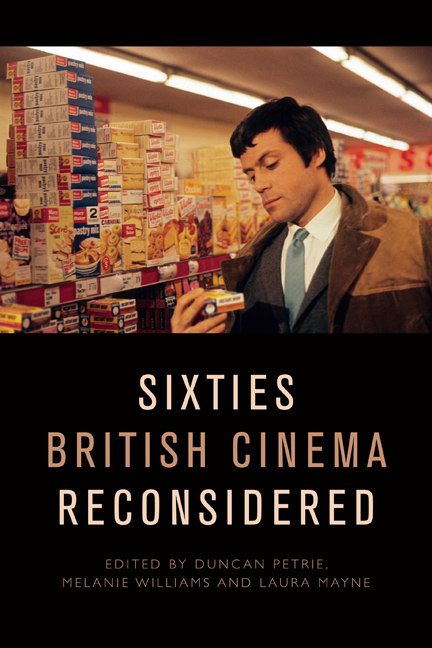Book contents
- Frontmatter
- Contents
- List of Figures and Tables
- Notes on the Contributors
- Introduction
- PART ONE STARS AND STARDOM
- 1 Male Stardom in 1960s British Cinema
- 2 ‘Rebel Rebel’?: Oliver Reed in the 1960s
- 3 Carol White: The Bardot of Battersea
- 4 ‘The Old Wave at Work’: The Transatlantic Stardom of the British Character Actress in the 1960s
- PART TWO CREATIVE COLLABORATIONS
- 5 Woodery-pokery: Charles Wood’s Sixties Screenwriting
- 6 ‘Beyond Naturalism’: Jocelyn Herbert, If . . . (1968) and Design for Performance in 1960s British Cinema
- 7 Kes: From Page to Screen
- 8 ‘I’d like to remember you as you are – as just a grumpy old man’: Joseph Losey and the Making of Figures in a Landscape (1970)
- PART THREE STYLE AND GENRE
- 9 ‘Wholesome rough stuff’: Hammer Films and the ‘A’ and ‘U’ Certificate, 1959–65
- 10 Widescreen Pyrotechnics: Shot Composition and Staging in the Cold War Films of Joseph Losey and Sidney J. Furie
- 11 The Rise and Fall of the Colourful Corporate Fantasy in 1960s British Cinema
- 12 Witchfinders and Sorcerers: Sorcery and Counterculture in the Work of Michael Reeves
- PART FOUR CULTURAL TRANSFORMATIONS
- 13 ‘An Impulse of Anger, Instantly Regretted’: Rebellion and Reaction in the Early-1960s Naval Film
- 14 Narratives of Race and Identity in Sixties British Cinema
- 15 Panic at the Disco: Brainwashing, Alienation and the Discotheque in Swinging London Films
- Index
3 - Carol White: The Bardot of Battersea
Published online by Cambridge University Press: 22 September 2020
- Frontmatter
- Contents
- List of Figures and Tables
- Notes on the Contributors
- Introduction
- PART ONE STARS AND STARDOM
- 1 Male Stardom in 1960s British Cinema
- 2 ‘Rebel Rebel’?: Oliver Reed in the 1960s
- 3 Carol White: The Bardot of Battersea
- 4 ‘The Old Wave at Work’: The Transatlantic Stardom of the British Character Actress in the 1960s
- PART TWO CREATIVE COLLABORATIONS
- 5 Woodery-pokery: Charles Wood’s Sixties Screenwriting
- 6 ‘Beyond Naturalism’: Jocelyn Herbert, If . . . (1968) and Design for Performance in 1960s British Cinema
- 7 Kes: From Page to Screen
- 8 ‘I’d like to remember you as you are – as just a grumpy old man’: Joseph Losey and the Making of Figures in a Landscape (1970)
- PART THREE STYLE AND GENRE
- 9 ‘Wholesome rough stuff’: Hammer Films and the ‘A’ and ‘U’ Certificate, 1959–65
- 10 Widescreen Pyrotechnics: Shot Composition and Staging in the Cold War Films of Joseph Losey and Sidney J. Furie
- 11 The Rise and Fall of the Colourful Corporate Fantasy in 1960s British Cinema
- 12 Witchfinders and Sorcerers: Sorcery and Counterculture in the Work of Michael Reeves
- PART FOUR CULTURAL TRANSFORMATIONS
- 13 ‘An Impulse of Anger, Instantly Regretted’: Rebellion and Reaction in the Early-1960s Naval Film
- 14 Narratives of Race and Identity in Sixties British Cinema
- 15 Panic at the Disco: Brainwashing, Alienation and the Discotheque in Swinging London Films
- Index
Summary
Although her career spanned the 1940s through to the 1980s, Carol White is best remembered for her television and film roles of the 1960s. Hailed at the time as ‘the Battersea Bardot’ in the British press, White's nickname not only suggested an analogy to the continental sex symbol but also gestured towards the actress's working-class London provenance. These two elements of her star persona sat in uneasy alliance but also exemplified some of the recurrent concerns of 1960s British culture, which in turn made her a very meaningful star of the era.
Born in 1943 and named after film star Carole Lombard (but dropping the ‘e’), Carol White came from an aspirational working-class background. Her father, a scrap metal dealer and former boxer, enrolled her at the Corona Stage Academy near to their West London home, and exercised a controlling influence over White's life. She played many minor uncredited roles as a child in a range of successful British films. These include Kind Hearts and Coronets (1949), The Belles of St Tinian's (1954), Doctor in the House (1954), Moby Dick (1956) and The Thirty-Nine Steps (1959), before the supporting role of Sheila Dale in Carry on Teacher (1959) gained White her first public recognition. The following year, she played the lead in the B-movie Linda (1960), now a lost film, and was also cast as the girlfriend of Peter Sellers's ruthless gangster in Never Let Go (1960). Continuing to build a profile for her work across British television and film in the early 1960s, White was nonetheless back in the territory of uncredited bit parts when she appeared briefly in the Beatles’ first film A Hard Day’s Night (1964).
But it was a series of roles between 1965 and 1967 that saw Carol White catapulted into stardom. This began with the part of Sylvie in Up the Junction (1965), one of a trio of young working-class women whose lives were explored in the iconic Wednesday Play. This was followed by the central role of the eponymous protagonist in another BBC single drama, Cathy Come Home (1966), before a transition to the big screen (albeit with a higher profile than before) as Joy in Poor Cow (1967).
- Type
- Chapter
- Information
- Sixties British Cinema Reconsidered , pp. 47 - 62Publisher: Edinburgh University PressPrint publication year: 2020



